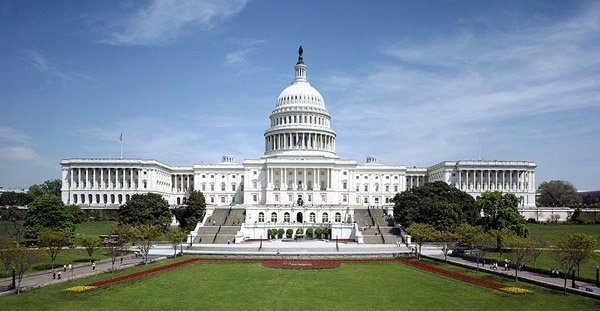As Washington Sets 2019 Policy Agenda, Semiconductor Priorities Central to Debate
Tuesday, Feb 05, 2019, 12:30pm
by John Neuffer, President and CEO
With the 116th Congress well underway and President Trump set to deliver his annual State of the Union Address tonight, policymakers are hard at work setting the legislative agenda for 2019. Figuring prominently into the policy debate in the nation’s capital are several issues of great significance to the U.S. semiconductor industry, including trade, export control, research investments, and workforce development.
In this period of divided government, SIA is committed to working with the Trump Administration and Congress to advance policies that strengthen the U.S. semiconductor industry, the broader tech sector, and our economy. The overarching goal of our 2019 policy priorities, outlined below, is to promote U.S. economic growth and innovation, while ensuring American businesses can compete on a level playing field with our competitors abroad.

Trade: More than 80 percent of U.S. semiconductor companies’ sales are to overseas customers, so free and open access to global markets is vital. We will work to maintain and expand access to these markets and support robust global trade. To that end, we’ll promote congressional approval of the U.S.-Mexico-Canada Agreement (USMCA), which would strengthen the digital economy and the semiconductor global supply chain. We’ll also urge enforcement of international trade rules to maintain a level playing field for U.S. businesses.
Export Control: Semiconductors are America’s fourth-largest export, following aircraft, refined oil, and automobiles, and a key driver of U.S. economic strength. For this reason, it is important for government and industry to work together to ensure U.S. export control policies both enhance our national security and continue to allow the U.S. semiconductor industry to grow and innovate. SIA will work with policymakers to ensure that controls are effective, multilateral, and narrowly tailored to address national security concerns and allow U.S. semiconductor companies to effectively compete in the global market.
Research: Research is the lifeblood of innovation in the semiconductor industry and throughout our economy. In order to realize the capabilities of key technologies – AI, IoT, high-performance computing, and others – that are expected to drive economic growth and technological innovation in the future, and to maintain leadership in the face of global competition, the U.S. needs to invest in advances in semiconductor technology. U.S. semiconductor companies annually invest about one-fifth of revenue in R&D, among the highest shares of any industry. We will continue to urge government to serve as a partner in this effort by substantially increasing federal investments in scientific research at DARPA, NIST, NSF, and DOE. We’ll also push policymakers to implement and support research programs that advance next-generation semiconductor technologies.
Workforce: At the heart of the U.S. semiconductor industry’s success is its workforce, which includes some of the best, brightest, and most innovative minds in the world. Unfortunately, U.S. semiconductor companies’ demand for top talent far exceeds supply, due largely to America’s outdated high-skilled immigration system. To meet this overwhelming short-term demand for talent, we must strengthen America’s technology workforce by promoting policies that attract and retain high-skilled workers in Science, Technology, Engineering and Math (STEM) fields. To meet long-term needs, we must invest in STEM education and develop the skills of the future American workforce.
Intellectual Property: Since intellectual property underpins virtually all semiconductor innovation, strong protection of IP is essential to our continued success. Semiconductor companies, including several SIA members, are regularly among the top recipients of U.S. patents each year. SIA will support efforts to prioritize IP enforcement, such as increased focus on the protection of trade secrets.
Tax: Enactment in late 2017 of sweeping legislation to reform America’s outdated corporate tax system was a welcome and long-overdue win for the U.S. semiconductor industry and a major step toward sustaining U.S. leadership in semiconductor research, design, and manufacturing. In 2019, we will continue to work to help shape the regulations needed to implement the corporate tax reform provisions contained in the new tax law.
Environment, Health, and Safety: The semiconductor industry is an acknowledged global leader in promoting environmental sustainability in the design, manufacture, and use of its products, as well as the health and safety of its operations and impacts on workers in semiconductor facilities. In 2019, we’ll work to ensure the regulations governing industry emissions of climate gases and the use of essential chemicals and materials achieve environmental goals while also enabling continued innovation in the industry.
Anti-counterfeiting: Semiconductors are the brains of countless products and systems that perform critical functions in our society. The failure of a single component in one of these products or systems can cause significant health, safety, and security risks. SIA will work with U.S. Customs and Border Protection and other enforcement agencies to stop counterfeit semiconductor products and increase prosecutions of counterfeiters. We’ll also work to reduce the supply of counterfeit semiconductors, especially in the government supply chain, by strengthening policies that encourage procurement through authorized sources.
America’s economic, technological, and national security infrastructure stand to gain when the U.S. semiconductor industry is at its competitive best. SIA looks forward to working with Congress and the Trump Administration in the year ahead to advance policies that strengthen our industry, the broader tech sector, and the U.S. and global economy.
